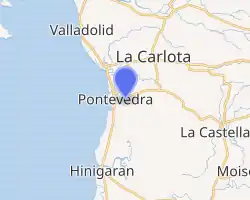Pontevedra, Negros Occidental
Pontevedra, officially the Municipality of Pontevedra, is a 3rd class municipality in the province of Negros Occidental, Philippines. According to the 2015 census, it has a population of 51,866 people. [3]
Pontevedra
Marayo | |
|---|---|
| Municipality of Pontevedra | |
 Seal | |
 Map of Negros Occidental with Pontevedra highlighted | |
OpenStreetMap 
| |
.svg.png.webp) Pontevedra Location within the Philippines | |
| Coordinates: 10°22′N 122°53′E | |
| Country | |
| Region | Western Visayas (Region VI) |
| Province | Negros Occidental |
| District | 4th district |
| Barangays | 20 (see Barangays) |
| Government | |
| • Type | Sangguniang Bayan |
| • Mayor | Jose Maria A. Alonso |
| • Vice Mayor | Jimmy C. Gavan |
| • Representative | Juliet Marie "Yoyet" D. Ferrer |
| • Electorate | 30,559 voters (2019) |
| Area | |
| • Total | 112.50 km2 (43.44 sq mi) |
| Elevation | 6.0 m (19.7 ft) |
| Population | |
| • Total | 51,866 |
| • Density | 460/km2 (1,200/sq mi) |
| • Households | 12,008 |
| Economy | |
| • Income class | 3rd municipal income class |
| • Poverty incidence | 16.59% (2015)[4] |
| • Revenue | ₱102,504,519.88 (2016) |
| Time zone | UTC+8 (PST) |
| ZIP code | 6105 |
| PSGC | |
| IDD : area code | +63 (0)34 |
| Climate type | tropical climate |
| Native languages | Hiligaynon Tagalog |
| Named after | Pontevedra, Spain |
The town celebrates the annual Handurayo Festival every May.
Former actress Rio Diaz served as vice mayor of the town from 1998 to 2004.
Geography
Also called Marayo, Pontevedra's center or poblacion area is marked by the newly renovated St. Michael the Archangel Parish, with the Saint Michael Academy beside it. To the east is the Public Market, ending up with Barangay Antipolo which is a notable place of some of prominent family "Hacienderos" as well as political clan of the town. The western side offers scenic views of the Panay Gulf as well as the Islands of Guimaras and Panay.
At the northern end of the town is Barangay San Juan which is named in honor of Saint John the Baptist and offers abundant turnip "singkamas" that is common in the area. Its southern part is Barangay Miranda, forming the boundary of Pontevedra and Hinigaran, where most people make their means of living through fishing.
Barangays
Pontevedra is politically subdivided into 20 barangays.
Climate
| Climate data for Pontevedra, Negros Occidental | |||||||||||||
|---|---|---|---|---|---|---|---|---|---|---|---|---|---|
| Month | Jan | Feb | Mar | Apr | May | Jun | Jul | Aug | Sep | Oct | Nov | Dec | Year |
| Average high °C (°F) | 30 (86) |
31 (88) |
32 (90) |
33 (91) |
32 (90) |
30 (86) |
29 (84) |
29 (84) |
29 (84) |
29 (84) |
30 (86) |
30 (86) |
30 (87) |
| Average low °C (°F) | 22 (72) |
22 (72) |
22 (72) |
24 (75) |
25 (77) |
25 (77) |
25 (77) |
24 (75) |
24 (75) |
24 (75) |
23 (73) |
23 (73) |
24 (74) |
| Average precipitation mm (inches) | 38 (1.5) |
29 (1.1) |
55 (2.2) |
65 (2.6) |
141 (5.6) |
210 (8.3) |
212 (8.3) |
176 (6.9) |
180 (7.1) |
180 (7.1) |
130 (5.1) |
70 (2.8) |
1,486 (58.6) |
| Average rainy days | 9.0 | 7.2 | 11.1 | 13.5 | 25.6 | 28.4 | 28.9 | 27.3 | 26.9 | 27.7 | 21.8 | 13.8 | 241.2 |
| Source: Meteoblue [5] | |||||||||||||
Demographics
| Year | Pop. | ±% p.a. |
|---|---|---|
| 1903 | 9,538 | — |
| 1918 | 10,817 | +0.84% |
| 1939 | 20,495 | +3.09% |
| 1948 | 18,060 | −1.40% |
| 1960 | 22,751 | +1.94% |
| 1970 | 27,007 | +1.73% |
| 1975 | 30,575 | +2.52% |
| 1980 | 33,258 | +1.70% |
| 1990 | 40,094 | +1.89% |
| 1995 | 42,443 | +1.07% |
| 2000 | 42,089 | −0.18% |
| 2007 | 46,768 | +1.46% |
| 2010 | 47,945 | +0.91% |
| 2015 | 51,866 | +1.51% |
| Source: Philippine Statistics Authority [3] [6] [7][8] | ||
References
- Municipality of Pontevedra | (DILG)
- "Province:". PSGC Interactive. Quezon City, Philippines: Philippine Statistics Authority. Retrieved 12 November 2016.
- Census of Population (2015). "Region VI (Western Visayas)". Total Population by Province, City, Municipality and Barangay. PSA. Retrieved 20 June 2016.
- "PSA releases the 2015 Municipal and City Level Poverty Estimates". Quezon City, Philippines. Retrieved 12 October 2019.
- "Pontevedra: Average Temperatures and Rainfall". Meteoblue. Retrieved 7 May 2020.
- Census of Population and Housing (2010). "Region VI (Western Visayas)". Total Population by Province, City, Municipality and Barangay. NSO. Retrieved 29 June 2016.
- Censuses of Population (1903–2007). "Region VI (Western Visayas)". Table 1. Population Enumerated in Various Censuses by Province/Highly Urbanized City: 1903 to 2007. NSO.
- "Province of". Municipality Population Data. Local Water Utilities Administration Research Division. Retrieved 17 December 2016.